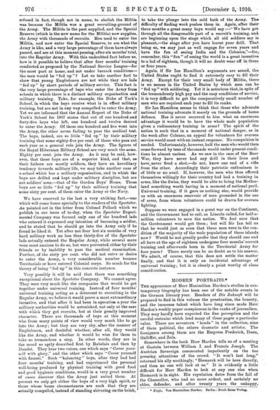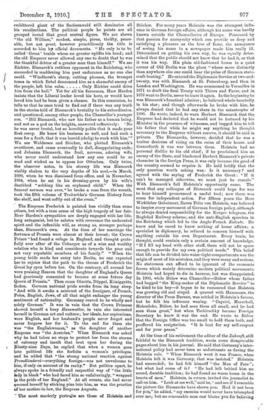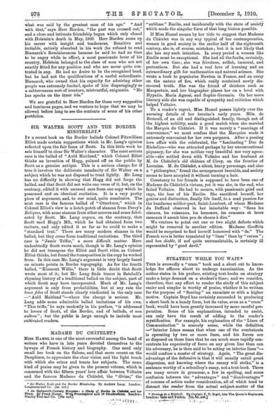MODERN PORTRAITS.* THE appearance of Herr Maximilian Harden's studies in
con- temporary biography has been one of the notable events in the German literary year. Readers of Die Zukunft will be prepared to find in this volume the penetration, the honesty, and the immense talent which have long since made Herr Harden's weekly paper conspicuous in the ranks of journalism. They may hardly have expected the fine perception and the careful restraint which lend many of these pages a particular value. There are seventeen " heads " in the collection, nine of them political, the others dramatic and artistic. The foreigners among them are the Empress Frederick, Ibsen, Gralliffet, and Zola.
Somewhere in the book Herr Harden tells us of a meeting at Gastein between William I. and Francis Joseph. The Austrian Sovereign commented impatiently on the too pressing attentions of the crowd. "It won't last long," returned his ally soothingly, "Bismarck.will be here directly, and then no one will look at us." It is evidently a little difficult for Herr Harden to look at any one else When Bismarck is in sight. His reputation dates from the fall of the Chancellor, who had no more ardent, and certainly no abler, defender, and after twenty years the unhappy, • KIVA Von 211"0.imil4an Harden. Berlin : Erich Reiss Verlag. embittered giant of the Sachsenwald still dominates all his • recollections. The political people Ise paints are all grouped round that great central figure. We are shown "the old William," modest, simple, pions, thrifty, peace- able, but not great, however punctiliously the title is accorded to him byl official document's. "He only is to be called • Great' beside whom no greater uplifts his head ; and the old Emperor never allowed any one to doubt that he was the thankful debtor of a greater man than himself." We see Richter, Bismarck's ruthless opponent in the Reichstag, who succeeded in maddening him past endurance as no one else could. " Windhorst's sharp, cutting phrases, the trumpet tones in which Bebel denounced him as a shameful enemy of the people, left him calm. . . . . . Only Richter could drive him from the hall." Yet for all his fierceness, Herr Harden insists that the Liberal leader loved his hero, or would have loved him had he been given a chance. In this connexion, he tells us that he once tried to find out if there was any truth in the stories told of Bismarck's brutality to his subordinates. and questioned, among other people, the Chancellor's younger con. "Bill Bismarck, who saw his father as a human being, and not as a god on the heights, answered reflectively No he was never brutal, but so horribly polite that it made your flesh creep. He knew his business so well, and had such a nose for a fault, that it was horrid (ehelig) to work with him." We see Waldersee and Stocker, who plotted Bismarck's overthrow, and came eventually to dull, disappointing ends ; and Johanna Bismarck, the frail, nervous, adoring wife, who never could understand how any one could be so mad and wicked as to oppose her Ottochen. Only twice, the observer notes, in his stormy life was Bismarck visibly shaken to the very depths of his soul,—in March, 3890, when he was dismissed from office, and in November, 1894, when he sat in his dressing-gown by his wife's deathbed "sobbing like an orphaned child." When the funeral sermon was over," he broke a rose from the wreath, took the fifth volume of Treitschke's German History from the shelf, and went softly out of the room."
The Empress Frederick is painted less vividly than some others, but with a true sense of the high tragedy of her fate. Herr Itarden's sympathies are deeply engaged with her life- long antagonist, but he salutes with reverence the undaunted spirit and the inflexible will, as strong as, stronger perhaps than, Bismarck's own. At the time of her marriage the fortunes of Prussia were almost at their lowest; the Crown Prince "bad found a refuge in England, and thought grate- iullj ever after of the Coburger as of a wise and wealthy relation who is kind and considerate towards the poor and not very reputable members of his family." " When the young bride made her entry into Berlin, no one expected ker to rejoice that the path to the throne of Frederiek the Great lay open before her. On the contrary, all around her were praising Heaven that the daughter of England's Queen Lad graciously consented to become at some future day Queen of Prussia." Then came Olmiitz, Diippel, Koniggriitz, Sedan. German national pride awoke from its long sleep. I.' And with it awoke a mistrust of the foreigner, of French, Poles, English, Jews, of all that might endanger the young sentiment of nationality. Germany craved to be wholly and Bole' y German." It was in vain that the Crown Princess showed herself a busy Hausmutter, in vain she interested herself in German art and culture; her ideals, her aspirations, were English, and her husband's people never forgot and never forgave her for it. To the end for them she was "the Englishwoman," as the daughter of• another Empress was "the Austrian." When Bismarck was asked why he had taken no steps to protect her from the storms of calumny and insult that beat upon her during the Ninety-nine Days, he replied that when a woman goes into political life she forfeits a woman's privileges, and he added that "the strong national reaction against :Frenakinderei—everything foreign—was not unwelcome to Lim, if only on account of its rarity.* But politics apart, he always spoke in a friendly and respectful way of "the little lady in black" who had faced him so unfalteringly, "wrapped ip the pride of her England." At all events, she had never amused herself by sticking pins into him, as was the practice a her mother-in-law, the Empress Augusta.
The most Masterly portraits are those of Holstein sad
Stocker. For many years Holstein was the strongest
enco in German foreign affairs, although his name was hardly known outside the Chancelleries of Europe. Possessed by that passion for anonymity which can provide as deep and satisfying a pleasure as the love of fame; the annoyance of seeing his name in a newspaper made him really ill. Determined on getting his own way, he was equally deter- mined that the public should not know that he had it, or that it was his way. His plain old-fashioned house in a quiet corner of Old Berlin was the place "where more distinctly than anywhere else one could hear the pulse of German state- craft beating." He entered the Diplomatic Service at two-and- twenty, was with Bismarck at St. Petersburg, and then in London and Washington. He was summoned to Versailles in 1871 to draft the final Treaty with Thiers and Fevre, and in 1876 went to Berlin, never to leave it again. In the beginning he was Bismarck's fanatical admirer ; he believed whole-heartedly in his star ; and though afterwards he broke with him, he always denied that he had any share in the catastrophe of 1890. He wrote, indeed, to warn Herbert Bismarck that the. Emperor had declaeed that he would not- be lectured by his Minister in the presence of witnesses, and begged him to tell his father that while he might say anything he thought necessary to the Empeior without reserve, it should be said in private. The Bismarcks, however, decided that he was a traitor desirous of rising on the ruins of their house, and thenceforth it was war between them. Holstein had no personal dislike to his old chief ; if he proclaimed him an enemy of the State, and blackened Herbert Bismarck's private character in the foreign Press, it was only because the good of the country seemed to require it: He held boldly that the only question worth asking was : Is it necessary ? and agreed with the saying of Frederick the Great "If it can't be managed otherwise, we must just be rascals." With Bismarck's fall Holstein's opportunity came. The most that any colleague of Bismarck could hope for was to hear himself pronounced a useful tool; now there was room for independent action. For fifteen years the Herr Wirklicher Geheinsrat, Baron Fritz von Holstein, was believed to inspire every movement of German foreign policy, although he always denied responsibility for the Kruger telegram, the Baghdad Railway scheme, and the anti-English speeches in the Reichstag which led to the Anglo-French Entente. He knew and he cared to know nothing of home affairs ; a specialist in diplomacy, he refused to concern hinsself with anything outside his own Department. Every brain, be thought, could contain only a certain amount of knowledge. "If I fill my head with other stuff, there will not be space enough to provide for my own political needs." This belief that life can be divided into water-tight compartments was the origin of most of his mistakes, and they were many and serious. No statesman can afford to be ignorant of the economic forces which mainly determine modern political movements. Holstein had hoped to die in harness, but was disappointed. In 1905, while Billow was Chancellor—Billow whose father had begged "the King-maker of the Diplomatic Service" to be kind to his boy—it began to be rumoured that Holstein was growing old and stupid. A quarrel with Hamnsann, the director of the Press Bureau, was settled in Holstein's favour, but he felt his influence waning. "Caprivi, Marschall, Hohenlohe, Billow, he had seen them all small, and lie had seen them great," but when Tschirschky became Foreign Secretary he knew it was the end. He wrote to Billow' that the Foreign Office was too small to hold them both, and proffered his resignation. "It is best for my self-respect
and for your 'peace." •
At the time of his retirement the editor of the Zukunft, still faithful to the Bismarck tradition, wrote some disagreeable pages about him in his journal. He said that Germany's inter- national policy had never been so unfortunate as during the Holstein rule. "When Bismarck went it was France, when Holstein left it was Germany, that was isolated." Holstein had succeeded; he had felt himself "the Man of Fate "; but what had come of it ? "He had left behind him no sound, durable tradition; he had found no warm home in the hearts of men." Holstein, in return, invited the journalist to call on him. "Look at me well," said be," and see if I resemble- the picture the Bismarcks have shown you. Had it not been for yet". he added, "my enemies would never have triumphed over me ; but no reasonable man can bla.lise- you for believing whal. was said by the greatest man of his age." " And with that," says Herr Harden, "the past was crossed, out," and a close and intimate friendship began -which only closed with Holstein's, death in May, 1909. Heir Harden sums up his career with insight and tenderness; Sensitive and irritable, entirely absorbed' in his work (he refueled to read Bismarck's Reminiscences because he said he had no time to be. augry while in office), a most passionate lover of his country, Holstein belonged to the class of men who are not exactly fitted for any position and who are never quite con- tented in any. He had no desire to be the recognised head, but he had not the qualifications of a useful subordinate. Bismarck, who owned that his capacity for admiring other people was extremely limited, spoke of him disparagingly as a subterranean sort of Creature, miertiustfUl; enigmatic. "He has specks on the inner iris."
We are grateful to Herr. Harden for these very suggestive and luminous pages, and we venture to hope that we may be allowed before long to see the contents of some of his other portfolios.












































































 Previous page
Previous page